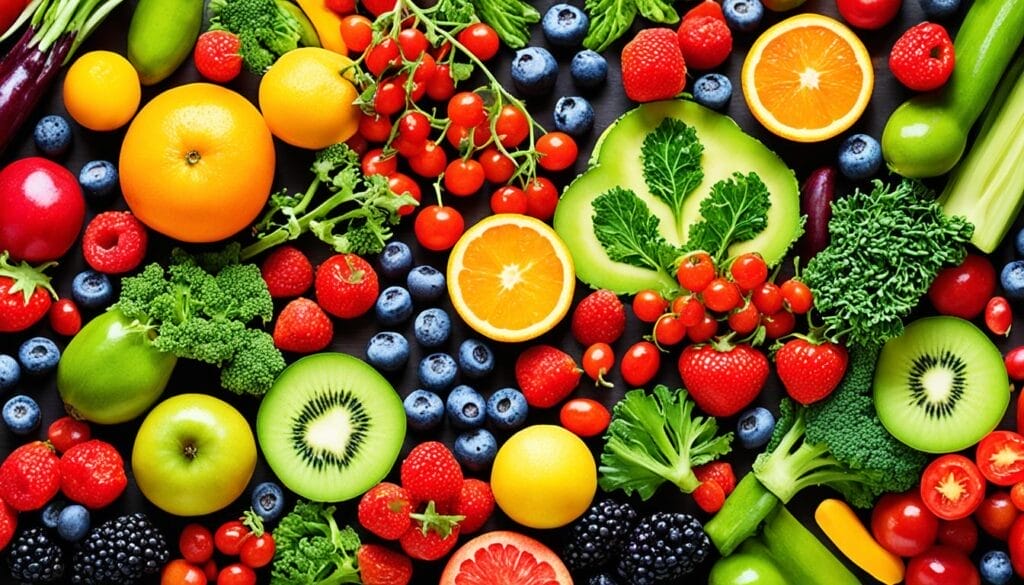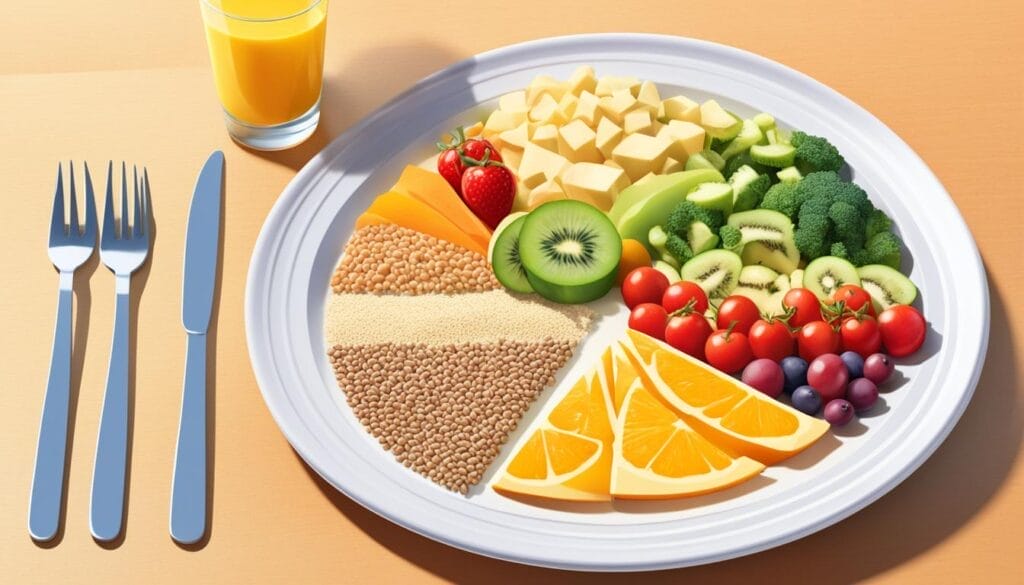As I embarked on my journey to adopt a healthier lifestyle, one thing became clear – the importance of nutrient-rich foods. It was no longer about simply filling my plate; it was about nourishing my body with the essential nutrients it needed for optimal health.
I started exploring different superfoods and vitamin-rich foods, eager to discover the key to a wholesome diet. Along the way, I stumbled upon a range of mineral-rich foods that not only provided incredible health benefits but also added a burst of flavour to my meals.
These antioxidant-rich foods quickly became staples in my kitchen as I realised their significant impact on my overall well-being.
Key Takeaways:
- Explore nutrient-rich foods to enhance your diet
- Discover the power of superfoods and vitamin-rich foods
- Incorporate mineral-rich foods for optimal health
- Experience the benefits of antioxidant-rich foods
Salmon
Salmon is a nutrient-dense food that plays a key role in maintaining a balanced diet and providing essential nutrients. It is particularly rich in omega-3 fatty acids, which are vital for supporting the proper functioning of various bodily systems. These omega-3s have been linked to numerous health benefits, such as reducing inflammation, improving heart health, and supporting brain function.
In addition to omega-3s, salmon is an excellent source of high-quality protein, which is essential for building and repairing tissues in the body. It also contains a range of vitamins and minerals, including vitamin B12, vitamin D, selenium, and potassium. These nutrients are important for supporting overall health and well-being.
Let’s take a closer look at the nutritional profile of wild Atlantic salmon.
| Nutrient | Amount per 100g |
|---|---|
| Omega-3 Fatty Acids | 2.2 grams |
| High-Quality Protein | 25.4 grams |
As you can see, a 100-gram serving of wild Atlantic salmon provides a substantial amount of omega-3s and high-quality protein. Adding salmon to your diet can be a delicious and nutritious way to meet your nutrient needs and support your overall health.
Sardines
Sardines are small oily fish that are packed with essential nutrients. They are a great addition to a balanced diet and offer a multitude of health benefits. These nutrient-rich fish are particularly known for their abundance of omega-3 fatty acids, which play a crucial role in maintaining overall health.
Omega-3 fatty acids are essential nutrients that the body cannot produce on its own. They are known to promote heart health, reduce inflammation, and support brain function. Sardines are an excellent source of omega-3s, making them a valuable addition to any diet.
But the benefits of sardines don’t stop there. These tiny fish provide a little bit of almost every nutrient your body needs. They are rich in protein, vitamins, and minerals, including vitamin D, vitamin B12, calcium, and selenium. Including sardines in your diet can help boost your intake of these essential nutrients, contributing to your overall well-being.
Not only are sardines a nutrient powerhouse, but they are also sustainable and affordable. They are small fish that are low in the food chain, which means they accumulate fewer toxins like mercury compared to larger predatory fish. This makes sardines a safe and sustainable choice for those looking to incorporate nutrient-rich foods into their diet.

The Health Benefits of Sardines:
- Rich in omega-3 fatty acids, which support heart health and brain function.
- A good source of protein, vitamins, and minerals, including vitamin D, vitamin B12, calcium, and selenium.
- Helps reduce inflammation in the body.
- Supports bone health and calcium absorption.
- Contributes to a healthy immune system and cell function.
Adding sardines to your meals is easy and versatile. You can enjoy them on their own, grilled, or baked, or use them as a protein-packed addition to salads, pastas, or sandwiches. With their rich flavour and impressive nutritional profile, sardines are a perfect addition to any nutrient-rich diet.
Kale
Kale is a green leafy vegetable that is highly nutritious and packed with essential nutrients. It is rich in vitamins C, A, K, and B6, as well as minerals like potassium, calcium, magnesium, and manganese. Kale is also a good source of fibre and antioxidants, making it one of the most nutrient-dense vegetables you can eat.
Not only does kale provide a range of vitamins and minerals, but it also offers other health benefits. The fibre in kale can help support digestive health and promote feelings of fullness, making it a great addition to a balanced diet. Additionally, the antioxidants found in kale have been linked to reduced inflammation and protection against chronic diseases.
To incorporate kale into your meals, try using it as a base for salads, sautéing it with garlic and olive oil, or adding it to smoothies for an extra nutrient boost. Its versatile nature allows for a variety of culinary creations.
Benefits of Kale:
- High in essential vitamins and minerals
- Good source of fibre for digestive health
- Rich in antioxidants to protect against chronic diseases
- Versatile for use in various recipes
Kale truly deserves its place among the nutrient-rich foods that can contribute to a balanced diet. Its vibrant colour and wholesome nutritional profile make it a valuable addition to any meal. Whether enjoyed raw or cooked, kale is a versatile and delicious way to nourish your body with essential nutrients.
Seaweed
When it comes to nutrient-rich foods, seaweed deserves a prime spot on your plate. This underwater wonder is packed with essential nutrients that can support your overall health and well-being. Seaweed is not only a delicious addition to your meals but also a fantastic source of minerals like calcium, iron, magnesium, and manganese.

If you’re looking to boost your iodine intake, seaweed is an excellent choice. This sea vegetable is rich in iodine, a mineral that is essential for proper thyroid function. By incorporating seaweed into your diet, you can ensure that your body receives the necessary iodine it needs to thrive.
But that’s not all – research suggests that seaweed may have antioxidant properties, which can provide protection against oxidative stress. Antioxidants are essential for combating free radicals in the body and promoting overall health.
So how can you enjoy the benefits of seaweed? There are many ways to incorporate this versatile ingredient into your meals. Add it to your favourite salads, soups, or stir-fries for an extra boost of nutrients. You can also try using seaweed sheets, like nori, as a wrap for sushi or a crispy topping for your dishes.
Benefits of Seaweed:
- Rich in minerals like calcium, iron, magnesium, and manganese
- Great source of iodine for optimal thyroid function
- Potential antioxidant properties to combat oxidative stress
Don’t miss out on the incredible nutritional benefits that seaweed has to offer. Get creative in the kitchen and explore the various ways you can incorporate this nutrient-packed sea vegetable into your meals!
Garlic
Garlic is a nutrient-dense food that is both tasty and healthy. It provides a range of vitamins and minerals, including vitamins C, B1, and B6, calcium, potassium, copper, manganese, and selenium. Garlic also contains allicin, a sulfur compound that has confirmed disease-fighting properties. Adding garlic to your meals can not only enhance the flavour but also provide a boost of essential nutrients.

| Vitamin | Mineral |
|---|---|
| Vitamin C | Calcium |
| Vitamin B1 | Potassium |
| Vitamin B6 | Copper |
| – | Manganese |
| – | Selenium |
Shellfish
When it comes to nutrient-rich foods, shellfish have a well-deserved spot on the list. Varieties such as clams, oysters, scallops, and mussels are not only delicious but also packed with essential nutrients that can contribute to a balanced diet.
Shellfish are a great source of vitamins, minerals, and high-quality animal protein. These nutrients are vital for maintaining optimal health and well-being.
“The consumption of shellfish provides a wide range of essential nutrients that support overall health and well-being,” says nutrition expert Dr. Emily Clarke. “Including shellfish in your diet can help ensure you’re getting the vitamins and minerals your body needs.”
One of the standout nutrients found in shellfish is vitamin B12. This essential vitamin is crucial for the production of red blood cells and the maintenance of a healthy nervous system. Clams, in particular, are exceptionally high in vitamin B12, making them an excellent choice for boosting your intake of this vital nutrient.
Zinc is another essential nutrient found in shellfish. It plays a crucial role in various bodily functions, including immune function, cell growth and division, and wound healing. Incorporating shellfish into your diet can help ensure sufficient zinc intake, promoting optimal health and well-being.
“The combination of vitamin B12 and zinc found in shellfish provides multiple health benefits,” explains Dr. Clarke. “These nutrients contribute to the proper functioning of essential bodily systems and support a strong immune system.”
To incorporate shellfish into your diet, try adding them to dishes like pastas, stir-fries, or salads. Their unique flavours and textures can elevate any meal, while their nutrient content adds a healthy boost to your plate.

Summing Up
Incorporating nutrient-rich foods into my diet has been essential for maintaining a balanced and wholesome eating routine. These foods have provided me with a wide range of essential nutrients, including vitamins, minerals, and antioxidants. Adding super-foods like salmon, sardines, kale, seaweed, garlic, and shellfish to my meals has not only satisfied my taste buds but also supported my overall health and well-being.
By consuming these nutrient-rich foods, I’ve experienced numerous health benefits. The omega-3 fatty acids found in salmon and sardines have supported the proper functioning of my bodily systems. The vitamins and minerals in kale have helped boost my immune system. The iodine in seaweed has improved my thyroid function, and the allicin in garlic has provided disease-fighting properties. Additionally, shellfish has provided me with a rich source of vitamin B12 and zinc, supporting my health and well-being.
And by incorporating these nutrient-rich foods into my meals, I have discovered that eating a balanced diet is both delicious and nutritious. These superfoods have been the foundation of my wholesome eating routine, ensuring that I am meeting my nutritional needs. Whether it’s enjoying a mouth-watering salmon dish or adding kale to a nutritious smoothie, these nutrient-rich foods have played a vital role in promoting my overall health and well-being.
FAQ
Why are nutrient-rich foods important for a balanced diet?
Nutrient-rich foods provide a wide range of essential nutrients, such as vitamins, minerals, and antioxidants, which are crucial for maintaining overall health and well-being. Including these foods in your diet ensures that you are meeting your nutritional needs and reaping the health benefits they offer.
What are superfoods?
Superfoods are nutrient-rich foods that are particularly beneficial for health due to their high concentration of essential nutrients. They are typically rich in vitamins, minerals, antioxidants, and other beneficial compounds.
What are some examples of nutrient-rich foods?
Some examples of nutrient-rich foods include salmon, sardines, kale, seaweed, garlic, and shellfish. These foods are packed with essential nutrients that can support overall health and well-being when incorporated into a balanced diet.
How do nutrient-rich foods support overall health?
Nutrient-rich foods provide essential nutrients, such as vitamins, minerals, and antioxidants, that help support various bodily functions, maintain a strong immune system, promote healthy skin, and contribute to overall well-being.
Can nutrient-rich foods help prevent certain diseases?
Nutrient-rich foods, especially those rich in antioxidants, have been associated with a lower risk of chronic diseases such as heart disease, certain cancers, and age-related macular degeneration. However, it is important to maintain a balanced diet and engage in other healthy lifestyle practices for disease prevention.
How can I incorporate nutrient-rich foods into my meals?
You can incorporate nutrient-rich foods into your meals by including them as ingredients in salads, stir-fries, soups, and smoothies. Additionally, you can enjoy them as snacks or as part of main dishes to increase your nutrient intake throughout the day.
Are nutrient-rich foods suitable for everyone?
Nutrient-rich foods are generally suitable for everyone, as they provide essential nutrients necessary for optimal health. However, individuals with specific dietary needs or allergies should consult with a healthcare professional or registered dietitian before making significant changes to their diet.
Source Links
Share Me:
READY TO UNLEASH
YOUR BEST SELF?
Click “Sign Me Up!” And Start Your Fitness Transformation!





